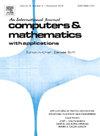宏观自动驾驶汽车交通流模型近似解数值方法比较研究
IF 2.9
2区 数学
Q1 MATHEMATICS, APPLIED
引用次数: 0
摘要
本文采用粒子法来近似求解自动驾驶车辆的 "类流体 "宏观交通流模型。结果表明,该方法保留了宏观交通模型中的某些微分不等式:质量不变,机械能在衰减,能量函数也在衰减。为了证明粒子法的优势,我们将其与其他粘性可压缩流体模型的数值方法进行了比较。由于宏观交通模型的解可以用由单个非线性热型偏微分方程组成的简化模型的解来近似,粒子法产生的数值解也与简化模型的数值解进行了比较。最后,提供了一个交通模拟场景,并与 Aw-Rascle-Zhang (ARZ) 模型进行了比较,说明了使用自动驾驶车辆的优势。本文章由计算机程序翻译,如有差异,请以英文原文为准。
A comparative study of numerical methods for approximating the solutions of a macroscopic automated-vehicle traffic flow model
In this paper, a particle method is used to approximate the solutions of a “fluid-like” macroscopic traffic flow model for automated vehicles. It is shown that this method preserves certain differential inequalities that hold for the macroscopic traffic model: mass is preserved, the mechanical energy is decaying and an energy functional is also decaying. To demonstrate the advantages of the particle method under consideration, a comparison with other numerical methods for viscous compressible fluid models is provided. Since the solutions of the macroscopic traffic model can be approximated by the solutions of a reduced model consisting of a single nonlinear heat-type partial differential equation, the numerical solutions produced by the particle method are also compared with the numerical solutions of the reduced model. Finally, a traffic simulation scenario and a comparison with the Aw-Rascle-Zhang (ARZ) model are provided, illustrating the advantages of the use of automated vehicles.
求助全文
通过发布文献求助,成功后即可免费获取论文全文。
去求助
来源期刊

Computers & Mathematics with Applications
工程技术-计算机:跨学科应用
CiteScore
5.10
自引率
10.30%
发文量
396
审稿时长
9.9 weeks
期刊介绍:
Computers & Mathematics with Applications provides a medium of exchange for those engaged in fields contributing to building successful simulations for science and engineering using Partial Differential Equations (PDEs).
 求助内容:
求助内容: 应助结果提醒方式:
应助结果提醒方式:


